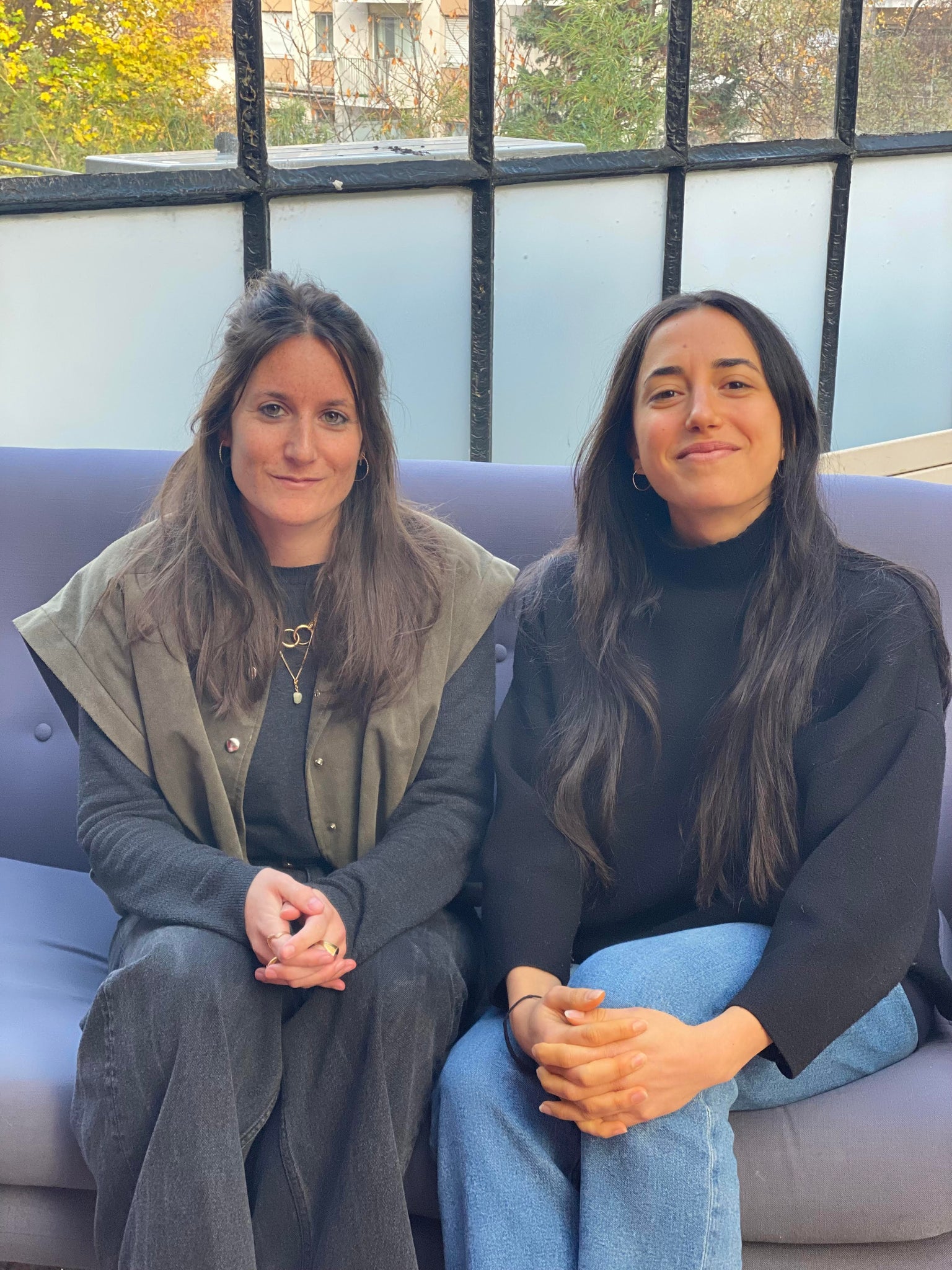The Her-Age team took a closer look at the innovative minds behind Oly, a platform that's been making waves in the industry with their technology that helps fashion secondhand resellers list their catalog across all marketplaces automatically. In this article, we'll delve into the journey and vision of the co-founders who set out to revolutionize the world of resale.
Can you tell us about the inspiration behind creating Oly and what problem it aims to solve in the market?
Oly was born out of our own, Marion and Paula’s, pain points as professional resellers. We realized we were losing more than 40 hours per month on repetitive listings tasks. It’s important to understand that in second-hand e-commerce, every item has a unique SKU and description therefore the listing process is much more time-consuming than for merchants selling new products. We tried to look for solutions but we noticed that there weren't any tools that addressed the issues second-hand merchants encounter to sell online.
The second realization was that this friction on the listing process was slowing down the time-to-market of products, and therefore impacting marketplaces that needed the merchandize listed.
So we launched Oly, the platform that accelerates the distribution of resale fashion between sellers and marketplaces
What unique features or capabilities does Oly offer that set it apart from other similar platforms in the industry?
Oly is the only platform which specializes in high-end resale fashion. We partner with the leading luxury resale platforms in Europe and are the only aggregator with this selection of marketplaces. We are expanding to other areas and recently launched a collaboration with Libas, luxury resale marketplace in Dubai.
Another distinctive feature we provide is our automated data mapping, tailored to the specific requirements of each marketplace. This ensures that products are listed correctly in their respective categories on every platform, with all essential fields accurately filled. Before onboarding any seller, we establish a customized data mapping based on their unique categories and taxonomy. This meticulous mapping guarantees optimal visibility for the seller's products across all marketplaces.
Lastly, and probably the most important differentiator for us, is our commitment to customer support. While most aggregators rely on chatbots to address user inquiries, we prioritize building meaningful human relationships with our users, placing a strong emphasis on trust and personalized support.
Could you elaborate on the technology stack and architecture that powers Oly?
Oly operates as an intermediary between sellers and marketplaces, facilitating the seamless flow of product and stock information.
We harness APIs to establish connections with sellers' e-shops and marketplaces. Oly functions bidirectionally through APIs:
1. From the seller's e-shop to the marketplaces: We connect to the seller's website, such as Shopify or WooCommerce, to retrieve the product catalog and real-time product data updates, which are then synchronized with the Oly interface. Then, we push the products selected by the seller to the chosen marketplaces and automate the inventory update to avoid double sales.
2. From the marketplaces to the seller's e-shop: Oly manages order notifications for marketplaces that support this feature. It automatically updates inventory levels on the seller's website in response to sales.
How do you envision Oly evolving in the next 2-3 years, and what new features or enhancements can users expect?
We want to become the all-in-one digital solution for digitalizing fashion secondhand supply. Our goal is to simplify every critical step in the digitalization and distribution process, from product description generation to pricing and multi-listing on various sales channels.
We envision a future where resale merchants can streamline their operations further, requiring nothing more than taking a photo. Oly would then automatically create product descriptions, categorize items, and provide pricing recommendations, allowing sellers to focus on their core business activities.
Building a startup can be challenging. What were some of the major obstacles you faced while developing and launching Oly, and how did you overcome them?
One of the primary challenges of running a startup is prioritization. With limited resources, it's essential to be discerning about where you and your team invest time and effort. At Oly, we implement the OKR (Objectives and Key Results) methodology to set quarterly and monthly goals. This approach enables our team to align with our overarching vision and facilitates effective prioritization.
Can you talk about your monetization strategy for Oly? What pricing models or subscription plans do you offer to customers?
Oly’s pricing model is based on the size of each seller's catalog. Our primary value proposition to sellers is time-saving in listing and inventory management. To ensure a positive return on investment for our subscribers, we calculated the time and monetary resources that seller teams typically expend on these tasks.
We offer a range of monthly subscription plans, with pricing determined by the number of new products sellers list each month. This fixed cost can be seamlessly integrated into sellers' margin calculations.
Our subscription plans start at €39 per month for sellers listing fewer than 20 new products monthly.
Additionally, there is a one-time setup fee, which varies based on the size of the catalog. This fee encompasses the implementation of the e-shop connection, personalized data mapping setup, and user onboarding support for marketplaces.
Collaboration and user feedback often drive product improvement. How do you involve users in the development process and incorporate their suggestions?
User involvement and feedback are integral to our product development process. This approach is deeply embedded in our company culture, as we co-built Oly in collaboration with our initial users. Before Oly's launch, we conducted numerous interviews with professional resellers and continually sought their input during the product's development.
Today, we conduct quarterly feedback sessions where our users share their comments and ideas. These sessions serve as an opportunity to align our development roadmap with user priorities and gain insights into what features and improvements matter most to them.
Oly likely has a diverse user base. How do you ensure that the platform's user experience remains intuitive and valuable for users with varying levels of technical expertise?
We surely have a diverse user base! But one of the key things with Oly is that you do not need to have any kind of technical expertise to become a user. Our value proposition revolves around simplifying the technical complexities, to enable users to do what they love and where they bring the most value: sourcing and selling amazing products.
Nevertheless, we recognize that some users may find it challenging to grasp specific taxonomy systems on particular marketplaces. To address this, we provide personalized onboarding sessions and closely support users during their initial weeks to ensure a seamless and clear experience.
Can you discuss any partnerships or integrations that Oly has established to enhance its functionality or reach?
We have established partnerships with several key marketplaces, including Vestiaire Collective, The Vintage Bar, Miinto, Joli Closet, and Libas.
What are some of the key lessons you've learned as co-founders while building and growing Oly? Is there anything you would have done differently in hindsight?
Communication is everything! Building a company can be tough and if you don’t learn how to communicate honestly and respectfully with your co-founders, you might breed resentment if certain dissatisfactions don’t change over time. We started giving feedback to each other from the very beginning and it’s probably the reason why we feel so aligned in all decision-making.
Could you provide insights into the company culture at Oly and how it contributes to the success of the platform?
At Oly, our company culture is defined by four core values: "Trust, Freedom, Positivity, and Purpose".
These values not only guide how we interact and collaborate as a team but also shape our relationships with our users and the product we're building.
Our users are entrepreneurs themselves who work very hard to make circular fashion grow. We share a common purpose with them, and our mission is clear: through our technology and platform, we aim to liberate some of their time and empower them to focus on growing their businesses.
We also strive to build trust in the relationships that we have with them, trust in our technology and trust in us as individuals.
Lastly, what advice would you give to aspiring entrepreneurs who are considering venturing into the tech startup space?
We have two essential pieces of advice for aspiring entrepreneurs:
1. Avoid the "all or nothing" mentality: You don't need to quit your job right away to pursue your startup idea. Begin by dedicating your evenings and weekends to work on your startup as a side-hustle. Gradually grow it into a full-fledged startup as you gain confidence and momentum.
2. Listen and engage with your users regularly: To be a successful entrepreneur, your primary goal should be solving a problem for someone. The only criterion that truly matters is whether your users feel that you've addressed their pain points. Therefore, actively listen, understand, and validate your solution with your users before investing months into developing something that may not meet their needs.
19/09/2023





Leave a comment